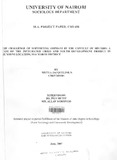| dc.description.abstract | There has been a growing concern about the care of the large numbers of orphans and other vulnerable children (OVCs) resulting from the widespread HIV/AIDS pandemic. Governments and non-governmental organizations have designed different interventions to deal with the orphan crisis. Such interventions have been helpful in enabling the orphans to continue with life. This study analyzed the support provided by Integrated Child and Youth Development Project to orphans in Mumbuni Location in the context of HIVIAIDS and increased poverty.
This was an evaluative study in nature and it attempted to place value on the support provided by Integrated Child and Youth Development Project to orphans. In so doing, the study sought to establish the orphans' real needs by understanding the local context within which they lived. It also sought to provide understanding about what could be the most suitable approach in addressing the needs of the orphans with an aim of improving existing policies and generating new ones for more appropriate interventions in the future.
The study had four specific objectives, namely: to establish the perception of orphanhood in Mumbuni Location and how it influences the support required; to determine the needs that orphans in Mumbuni Location had and the support provided by Integrated Child and Youth Development Project in the context of HIVIAIDS; to highlight how affected families and the community were coping with increased pumbers of orphans; and to assess the appropriateness
and relevance of the support provided to "
orphans in Mumbuni Location by Integrated Child
and Youth Development Project.
The study utilized qualitative methods to best understand the experiences of the orphans, their guardians, community leaders and the project staff. Two sub-locations were purposively chosen from the five sub-locations. From the two sub-locations (Kasinga and Mung'ala), twenty orphans, twenty guardians, twelve community health workers, four community leaders and three project staff were purposively chosen, making a total of 59 respondents.
The study confirmed that there was increased numbers of orphans in the location who were mostly cared for by their grandmothers. According to the study, the main challenge of supporting
I
orphans was inadequate conceptualization of orphanhood and orphans' needs. The study revealed a conceptual disconnect between policy and programs' definition of an orphan and that of the local community.
The findings showed that the dynamics associated with HIV IAIDS led to a shifting definition of an orphan to align with the reality of the pandemic. Orphans in the location faced multiple problems and challenges which if not addressed could limit the orphans' attainment of their full potential. The study showed that the orphans' view of their needs was influenced by their level of maturity and different stakeholders viewed orphans' needs according to their relationship and responsibility towards them. Contrary to the reviewed literature which showed that orphans because of lack of primary caregivers tend to be behaviorally maladjusted, the study established that most of the orphans were well behaved and had a good relationship with their guardians.
Although the support provided by the organization was limited in scale, the community was grateful and orphans who would have dropped out of school due to lack of school uniforms had remained in school. The project was able to create sufficient awareness to awaken the community leaders to the multiplicity of the problems faced by orphans and the necessity for their welfare. The project had also succeeded in providing parent figures who the orphans could easily access in times of need reducing the alienation associated with HIVIAIDS orphanhood. The study showed there was need to scale up the support so as to reach more orphans'
multifaceted needs, enable them overcome anxiety, build resilience and fulfill their potential.
'
Although the challenges facing orphans and guardians were serious, the study noted that this community if well organized could handle this problem without much outside support. The study recommends that subsequent interventions consider the guardians' capacity to provide care. It also recommends that support be provided to both the orphans and their guardians. In addition, NGOs and CBOs "need to adequately conceptualize the needs of the orphans and community attitudes to give appropriate and relevant support. There is need for the government to design policies that meet the health, education needs of orphans and their guardians. | en |

